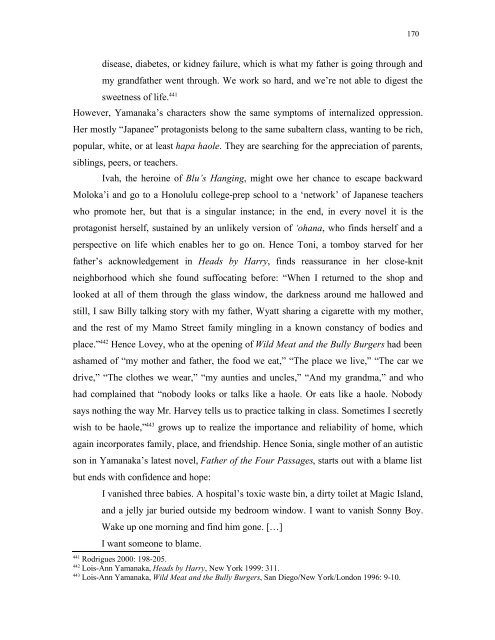A Paradise Lost - KOPS - Universität Konstanz
A Paradise Lost - KOPS - Universität Konstanz
A Paradise Lost - KOPS - Universität Konstanz
You also want an ePaper? Increase the reach of your titles
YUMPU automatically turns print PDFs into web optimized ePapers that Google loves.
disease, diabetes, or kidney failure, which is what my father is going through and<br />
my grandfather went through. We work so hard, and we’re not able to digest the<br />
sweetness of life. 441<br />
However, Yamanaka’s characters show the same symptoms of internalized oppression.<br />
Her mostly “Japanee” protagonists belong to the same subaltern class, wanting to be rich,<br />
popular, white, or at least hapa haole. They are searching for the appreciation of parents,<br />
siblings, peers, or teachers.<br />
Ivah, the heroine of Blu’s Hanging, might owe her chance to escape backward<br />
Moloka’i and go to a Honolulu college-prep school to a ‘network’ of Japanese teachers<br />
who promote her, but that is a singular instance; in the end, in every novel it is the<br />
protagonist herself, sustained by an unlikely version of ‘ohana, who finds herself and a<br />
perspective on life which enables her to go on. Hence Toni, a tomboy starved for her<br />
father’s acknowledgement in Heads by Harry, finds reassurance in her close-knit<br />
neighborhood which she found suffocating before: “When I returned to the shop and<br />
looked at all of them through the glass window, the darkness around me hallowed and<br />
still, I saw Billy talking story with my father, Wyatt sharing a cigarette with my mother,<br />
and the rest of my Mamo Street family mingling in a known constancy of bodies and<br />
place.” 442 Hence Lovey, who at the opening of Wild Meat and the Bully Burgers had been<br />
ashamed of “my mother and father, the food we eat,” “The place we live,” “The car we<br />
drive,” “The clothes we wear,” “my aunties and uncles,” “And my grandma,” and who<br />
had complained that “nobody looks or talks like a haole. Or eats like a haole. Nobody<br />
says nothing the way Mr. Harvey tells us to practice talking in class. Sometimes I secretly<br />
wish to be haole,” 443 grows up to realize the importance and reliability of home, which<br />
again incorporates family, place, and friendship. Hence Sonia, single mother of an autistic<br />
son in Yamanaka’s latest novel, Father of the Four Passages, starts out with a blame list<br />
but ends with confidence and hope:<br />
I vanished three babies. A hospital’s toxic waste bin, a dirty toilet at Magic Island,<br />
and a jelly jar buried outside my bedroom window. I want to vanish Sonny Boy.<br />
Wake up one morning and find him gone. […]<br />
I want someone to blame.<br />
441 Rodrigues 2000: 198-205.<br />
442 Lois-Ann Yamanaka, Heads by Harry, New York 1999: 311.<br />
443 Lois-Ann Yamanaka, Wild Meat and the Bully Burgers, San Diego/New York/London 1996: 9-10.<br />
170

















